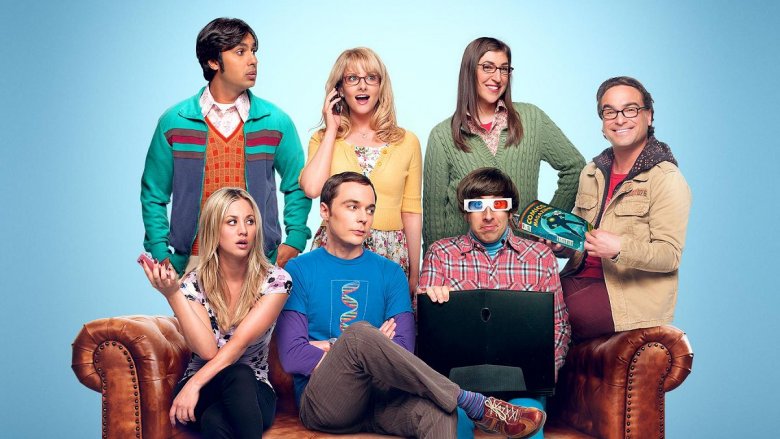The Big Bang Theory To Stream Exclusively On HBO Max Under Lucrative New Deal
Another day, another massively expensive streaming deal for a sitcom.
Just one day after Netflix scooped up the worldwide streaming rights to Seinfeld in a deal that's believed to be worth over a half-billion dollars, it was reported that WarnerMedia's upcoming service HBOMax shelled out even more for another popular sitcom that's no longer airing new episodes: The Big Bang Theory.
In the new deal announced on September 17 (via The Hollywood Reporter), WarnerMedia secured the rights to stream The Big Bang Theory exclusively on HBO Max, which marks the first time all episodes of the sitcom will stream on any service in the U.S.
Unlike the recent deals for Seinfeld, Friends, or The Office, however, The Big Bang Theory deal also comes with a traditional cable element. TBS previously had the exclusive rights to air the series' reruns through 2024, so in order to give up exclusivity by sharing the show with HBO Max, the cable channel will now be able to air episodes of the series until 2028 — while also presumably getting a chunk of whatever WarnerMedia paid out for the rights to the series.
As for what that amount is, sources differ. The Hollywood Reporter initially broke the story claiming the deal was worth several billion dollars. That's a staggering estimation, considering it's about double the already sky-high price that Netflix is reported to have paid for Seinfeld. And if you think that number seems awfully high, apparently so does everyone else, as Variety's sources put the price of the Big Bang Theory deal at a more realistic — but still astronomical — $600 million.
How WarnerMedia got The Big Bang Theory
Unlike the Seinfeld saga — which saw Netflix aggressively outbid other streaming players like Amazon, Hulu, NBCUniversal, Viacom, and WarnerMedia themselves — there was never really any doubt that The Big Bang Theory was going to end up with WarnerMedia's HBO Max. That's because WarnerMedia, one of the largest media conglomerates in the world, already owns the rights to The Big Bang Theory through its subsidiary Warner Bros. Television Distribution. WarnerMedia also owns TBS, the cable channel the company had to negotiate with in order to share the series with HBO Max. With WarnerMedia negotiating with two of its own properties (TBS and The Big Bang Theory) to allow one of those properties to stream on yet another one of their properties (HBO Max), there truly didn't exist the possibility of Netflix or Disney swooping in to make a bid. WarnerMedia reportedly didn't even bother shopping The Big Bang Theory around to other streaming services.
So why, then, did the company still pay so much money for it?
It comes down to profit participants. WarnerMedia may own the distributing rights to The Big Bang Theory, but it doesn't own the series entirely. The company still needs to pay other entities — specifically the series' co-creators, Chuck Lorre and Bill Prady. According to Variety, representatives for the pair observed the dealmaking process to ensure that WarnerMedia wasn't underpaying for the series (Fox was sued for allegedly doing just that when negotiating the streaming rights to Bones with Hulu, which it partly owned at the time). Apparently, it paid off.
Will The Big Bang Theory succeed as binge TV?
HBO Max no doubt thinks it's got a winner on its hands with The Big Bang Theory given how much the company shelled out for the right to stream it. But is that really the case?
The show's binge-worthiness is untested, and there are reasons to believe it won't perform all that well as a streamer. If you look at the other sitcoms that are successful streamers and that have recently commanded big paydays — Friends, The Office, Seinfeld — they all have a few things in common. First off, each of them has a certain nostalgia factor. Seinfeld and Friends dominated throughout the '90s, while The Office aired from 2005 to 2013. These series act as a time capsule for the '90s and the '00s, and that's one of the reasons why people enjoy returning to them. The Big Bang Theory, by contrast, ended its run just four months ago in May 2019. Are you nostalgic for early 2019? Didn't think so.
There's also the respective reputations of the shows. Friends, Seinfeld, and The Office are all critically-acclaimed, with each one having street cred in the comedy community. The Big Bang Theory, however, is famously loathed by comedy nerds, and has never been a critical darling. And while The Big Bang Theory was one of television's most-watched shows during its 12-season run, it earned those ratings on CBS — a network known for its older demographic — and its viewers' median age in 2018 was 56. In other words, the show's audience probably isn't really the streaming type.
Only time will tell whether The Big Bang Theory hits HBO Max with a bang, or if it bombs big time.


